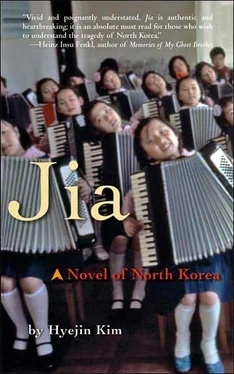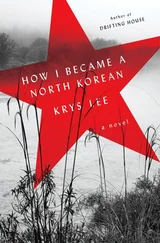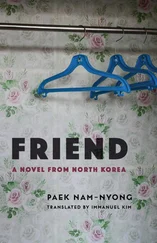Surrounding our house were mountains and an enormous valley, with trees and grass everywhere in between. The water was clean; we could drink it without a care, and my sister and I swam every day. Whenever I wasn’t sick, I was outside until late into the evening; I wanted to make up for my bedridden life with outdoor activities. Our grandparents assigned homework daily, usually the collection of mushrooms and herbs. Every night, huddled close together, we cleaned our harvest thoroughly, and the next day our grandparents brought it to the camp. My sister and I spent the days searching the mountains and valleys for new things to do and see. We held races to see who could swim faster; though I was much younger than my sister, my long arms and legs helped me win, or at least get abreast of her. It could be she simply gave me the chance.
I was curious about people and other places, and I read all the books my grandmother kept in her closet. They helped my sister and me forget about the gray faces and the thick, pointy wire fences, even for an hour. The photos in some of the books thrilled me, transporting us to places we had never been and introducing us to people we had never met. I had so many questions about what I saw in the pictures: the high buildings, the people walking on pavement, and especially the kids my own age dressed in nice clothing. These were photos taken in Pyongyang, North Korea’s biggest city, and from first sight, I dreamed of living there and walking those streets. My grandmother answered all my questions kindly, explaining everything in detail.
There was only one rule: I was never to ask about my father. My family’s refusal to talk about him convinced me he had done something terrible. Often I hugged my grandmother and grumbled that I despised my father, knowing he brought my family tragedy. I knew it was his fault that my mother was dead, and that we lived in such an isolated place. I cursed him over and over, but my grandmother consoled me, whispering that he never meant to hurt us. He was smart, she’d say, he just wasn’t lucky. That’s why people tried to hurt him. It was not his fault. His only fault was being born in the wrong place.
I learned my parents’ story the day before my unexpected farewell to my grandparents and my sister. I didn’t even get the chance to boast to my sister about what I had learned from Grandmother. I didn’t know it was the last gift she would give to me.
My Father’s and Mother’s Story
Everyone said that my father and mother never should have met, that it was the beginning of a tragic story. My mom was from a good family; as an only child, she was given everything she could have wanted. Her family belonged to the “core class,” the highest of the three government-assigned categories. Mom’s father occupied a high position in the army, and her mother was a vice principal at a small college. She inherited her father’s outstanding physique, and took advantage of it by studying at a professional dancing school.
Dancers shouldn’t be afraid to face any kind of dance: that was her dancing philosophy. Wearing the traditional hanbok, she was fragile and sweet in her movements, like a flying butterfly, but when she donned a military uniform, her movements expressed the spirit of a strong and passionate revolutionary soldier. Success as a famous dancer was every woman’s dream in North Korea. My mother’s talent and good background, and the support of her family, suggested that she would become the most famous dancer in Pyongyang. Then she met my father.
It was a bad match. My father, by contrast, had a complicated family: they belonged to one of the lower classes of society, the “wavering class.” My great-grandparents on my father’s side were exploited by the Japanese in the early part of the century; their mistake was to own too much land and to have too many servants. My grandfather grew up seeing his father regularly beaten by Japanese police and eventually stripped of his property.
When my grandfather was 15, a single incident changed his life forever. A secret guerrilla group agitating for independence passed through the town. They were caught by the Japanese police but resisted their captors, eventually killing them. After taking food and weapons from the police warehouse, the group hastily disappeared. The episode left the town’s young people excited and anxious.
Several days later, my grandfather disappeared from his house with only these written words: “I’m leaving to be a hero for my country.” He went to northeast China and instantly joined a guerrilla group. At that time, it was difficult to stage independence activities against Japan in Korea. Some Koreans protested with their feet, moving to northeast China and Joining Chinese nationalist or communist groups. Others conducted their own, purely Korean, activities. There were many young people like my grandfather: passionate about punishing the Japanese.
He didn’t take on the colors of any faction, and he wasn’t interested in ideology; his purpose was to see how many Japanese soldiers and policemen he could kill. He and his comrades lurked about in villages at night, looking for targets, and gathered in the mountains during the day. They learned how to make bombs and produce dynamite, using them to punish the Japanese police and the Korean stool pigeons. Their radical strategies made it difficult to get regular financial support from the usual associations that secretly funded such activities. They were always hungry, always cold, as they traveled back and forth between northeast China and the northern tip of Korea.
My grandmother was an obedient student and daughter, but she secretly supported independence activists, providing food for them and helping to write and distribute pamphlets. When my grandfather’s guerrilla group stayed in the vicinity of my grandmother’s town, the underground student association my grandmother belonged to helped them maintain their cover. She was the chief editor of the association at that time. My grandfather and grandmother had never even spoken privately before their marriage. They met only as comrades, with others around.
During these times, a horrible rumor spread through the village. People said the Japanese soldiers were dragging young, single women to the battlefield and using them as whores to console solders tired from battle.
The rumor that the women in my grandmother’s village would be targeted threw the village into chaos. Some families with adult daughters believed the Japanese soldiers would never do such a thing; others hurried to find single men willing to marry their girls. My grandfather went directly to my grandmother’s house and told her parents that he was taking her with his group when they left town. My grandmother’s parents objected strongly; they knew my grandfather’s life was dangerous—his life itself was in constant danger. My grandmother overheard the conversation, packed her belongings, and left her house with my grandfather without turning back. They were married before his comrades in the mountains and honeymooned in a cave.
From then on, hard times were their lot. World War II only made conditions worse. Just as the rumors predicted, women were dragged away by the Japanese Army. The Japanese killed anyone they even suspected of being against them. My grandfather’s group had to move every day, hiding in the mountains. Moving so often caused my grandmother to lose an unborn child five months into pregnancy and undergo another two consecutive natural abortions. When they finally delivered my father, their only child, in 1943, my grandmother wept for days. Though she was happy to have given birth, she couldn’t help but be afraid for my father. When the Japanese were defeated in 1945, she expressed her relief for him by saying, “He can get a regular education, in a normal school.”
Читать дальше












